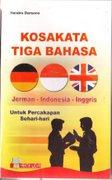Proto-English
The Germanic tribes who gave rise to the English language (the Angles, Saxons, Frisians, Jutes and perhaps even the Franks), traded with and fought with the Latin-speaking Roman Empire in the process of the Germanic invasion of Europe from the East. Many Latin words for common objects therefore entered the vocabulary of these Germanic people even before any of these tribes reached Britain; examples include camp, cheese, cook, fork, inch, kettle, kitchen, linen, mile, mill, mint (coin), noon, pillow, pin, pound, punt (boat), street, and wall. The Romans also gave English words which they had themselves borrowed from other languages: anchor, butter, chest, devil, dish, sack and wine.
According to the Anglo-Saxon Chronicle, around the year 449, Vortigern, King of the Britons, invited the "Angle kin" (Angles led by Hengest and Horsa) to help him in conflicts with the Picts. In return, the Angles were granted lands in the southeast of England. Further aid was sought and in response "came men of Ald Seaxum of Anglum of Iotum" (Saxons, Angles and Jutes). The Chronicle talks of a subsequent influx of settlers who eventually established seven kingdoms, known as the heptarchy. Modern scholarship considers most of this story to be legendary and politically motivated and the identification of the tribes with the Angles, Saxons and Jutes is no longer accepted as an accurate description (Myres, 1986, p. 46ff), especially since the Anglo-Saxon language is more similar to Frisian than any single one of the others.
Source: Answers.com





2 comments:
paten blognya!! masuki dong berita-berita komputer, ke web saya juga ya klik sini
I enjoyed rreading your post
Post a Comment